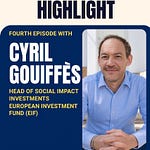Disclaimer from August Solliv: The views expressed are solely my own i.e. it’s my Sunday fun work 😉
Key insights:
Interview with Baudouin Hue, Partner at Karista.vc
Healthtech is often disregarded as an impact topic as most healthtech funds don’t take impact into account in their assessments. Karista and Baudouin prove that healthtech can be an impact topic
Karista splits up solutions in healthtech into 4 buckets: 1. Software in healthcare, 2. Outsourced R&D solutions, 3. Patient data for personalized care, and 4. Augmented medical devices
Karista prefers solutions that sell B2G and that can be reimbursed (by the state in Europe and insurance, primarily in the USA) - one of the angles to impact in healthcare is ensuring that most people have access to better treatments
Prices of medicine are 2x-10x higher in the US than in Europe - that’s why most healthtech move to the US as soon as they have succeeded in one or a couple of markets in Europe
Thanks for reading Impact Supporters! Subscribe for free to receive new posts and support my work.
Greetings to 3k+ Impact Supporters! 🌍 It’s August Solliv 👋 Let’s dive into healthtech (≈9 min reading time):
Is health an impact topic? 🏥
Are all healthtech VCs impact VCs? 🤔
Differentiating healthtech and biotech 🧬
Key solution areas in healthtech 💡
A geographical view of healthtech 🗺️
Healthtech in development economies 🌏
B2G vs B2C vs B2B 💼
Creating an A- and B-team in healthcare 🥇
Being an impact generalist VC in healthtech 🔍
Major trends in healthtech - Karista builds a growth fund 📈
Meet Baudouin Hue 👋
Baudouin is French, 40 years old, a happy father of three, and happily married. Baudouin has been at Karista for 10 years, and before that, he studied to become a mechanical engineer, then did a business degree, and then worked for 6 years for a global B2B service company called Bureau Veritas doing tests and inspections of facilities all across the world 🌍 At Bureau Veritas, Baudouin was primarily responsible for launching new services in the healthcare and sustainability sectors. Baudouin joined Karista to invest out of fund three, primarily in the healthcare sector, and now they are at fund five where they have a clear and strong impact angle 🌱
Meet Karista.vc 💼
Karista is a VC firm that dates back to 2001. Karista is investing in healthcare, digital, and deeptech out of multiple dedicated funds for each sector, and includes medical devices, diagnostics, digital health, and biotech in their health scope (but biotech is being phased out). Karista invests from Seed to Series B+ and onwards for initial checks.
Karista is known for being hands-on with founders to provide value to them, through allocating time to the founders and having an ecosystem of corporate players that they can connect founders to🤝
Baudouin describes everybody at Karista as purpose-driven 🎯 They run Karista to make high returns, but they do so by investing in companies that 1. provide better care that is measurable for patients at 2. lower cost, and 3. can get reimbursed so that they reach the largest amounts of people possible.
Is health an impact topic? 🏥
Firstly, simply put, healthtech is impact as its key objective is to save lives and deliver a high quality of life 🏥 As Baudouin puts it, there are few/no other industries with a similarly clear impact mission. Healthtech solutions ensure that patients recover from diseases or slow down disease progression to enable a high-quality life.
Secondly, impact in healthcare is also enabling that we can sustain the healthcare system. In most developed economies, there are increased costs of healthcare as the population is aging 👵 So the healthcare system needs new products and services that have lower costs, and to find new ways of financing healthcare costs (e.g. mutualization) 💸 For all healthcare solutions, impact VCs must assess whether a healthtech solution provides better care for patients and whether they do so at a lower cost.Thirdly, impact in healthcare is also about ensuring that the new healthtech can be provided to the broadest possible population - regardless of countries, languages, and available infrastructure. Today, it is primarily digital health solutions that enable this.
To give you a feeling for how big healthtech is. Below are two graphs from Dealroom. Healthtech is the fifth largest industry in VC investments globally and has been growing steadily across all sizes of rounds since the 2010s.
Source: Dealroom, 2023
Source: Dealroom, 2023
Are all healthtech VCs impact VCs? 🤔
Karista has been on a journey to prove that they are an impact VC. The key driver of the VC firm is to contribute to the health of people 👩⚕️ But as Baudouin sees it, being a healthtech VC is not enough to call yourself an impact VC. You need to follow specific standards and reporting formats and have impact as a KPI in your deals 📈
[Note from author: I recently had a chat with a biotech fund about whether they could characterize themselves as an impact fund. We arrived at the same conclusion – if you don’t track and report on your impact transparently, you are not an impact fund. Moreover, specifically in healthtech and biotech, if you don’t somehow take the accessibility of the medicine you create into account and have impact as a metric in your deals, then you can’t characterize yourself as an impact fund.]
Baudouin highlights that the EU regulation on sustainable finance disclosure is very clear for environmental impact, but still lags behind on social impact, incl. health impact. This is somehow paradoxical, because healthcare is probably one of the social impacts that is basically universal. Baudouin states that whether you live in Portugal or Estonia all you care about is that a disease is contained, managed, and cured and that patients are well taken care of. As EU regulation is not clear on social impact, Karista created its own set of KPIs for reporting to be in line with regulation and become a marketable financial good.
For Baudouin, having impact KPIs is just as much about aligning the interests of all stakeholders – the Karista investment team, management teams of portfolio companies, and LPs 👥
You might be thinking what are the key healthtech funds in Europe? - Karista gives us the answer and updates the list annually - find the most recent version here:
Source: Tech.eu, 2023
Differentiating healthtech and biotech 🧬
Healthtech is tech used in medical settings and includes both software and medical devices 🖥️ Biotech is deep science to develop new medical drugs 💊
Karista historically invested in biotech as well as healthtech, but has transitioned to focus solely on healthtech today. Karista made this decision as they believe that in the next decade software, AI, and medical devices will play an increasingly large role in transforming healthcare 🔍
Moreover, to invest in biotech, Karista believes that you ideally need a team of PhDs with strong sectoral expertise as well as a large portfolio to distribute the risk of each start-up. In biotech, the risk of a start-up failing remains permanent until a product hits the market because of trials and FDA approvals.
Key solution areas in healthtech 💡
In both the US and Europe, there is a shortage of medical capacity. Healthtech solutions can help free up some of that capacity. Baudouin highlights four buckets of solutions:
Software in healthcare
Outsourced R&D
Patient data for personalized care
Augmented medical devices
There is especially a growth in the first bucket and here Baudouin mentions:
AI in healthtech
Telemedicine
Software to improve processes in healthcare
Software to decrease the amount of failures ind the drug development process
Software to decrease the time it takes to bring a new drug to the market
A geographical view of healthtech 🗺️
At Karista they look at products that target universal medical needs, e.g. heart failure, dementia, etc. Karista, however, has a focus to European companies with global ambitions.
Usually, in Europe, founders prove their case domestically where they have connections with doctors and hospitals. And then quite quickly, they move to the US. That’s because the largest healthcare market in the world is the US - not in terms of headcount but in terms of bankable headcount. The price of healthcare solutions is 2x to 10x higher in the US than in Europe 🇺🇸
Another major driver of internationalization is the countries in which reimbursement is possible for the product that the start-up is developing 🌐 Start-ups look to expand where they see that they have the highest probability of success.
Healthtech in development economies 🌏
Equity is still an issue in healthcare. For example, malaria is the most lethal condition, but is underfunded 💔 You need to be directly on the field to prevent malaria and it is in a region with limited purchasing power, so it is supported largely by philanthropy capital - Karista does not do philanthropy.
Karista does, however, invest in developing economies - in primarily software solutions, as the marginal costs of software solutions are low so they can be deployed in countries with limited purchasing power 🌏
B2G vs B2C vs B2B 💼
Karista primarily invests in healthcare products that can be reimbursed (B2G) - for example in France that means reimbursed by the state 🇫🇷 For a solution to be reimbursed, you need to prove both the medical and health economical value of the solution i.e. the overall costs of taking care of the patient must decrease 💰
In the USA, the FDA needs to approve your solution, and then you have to prove the medical and health economic value to the insurer 🏛️
Baudouin, however, also says that he can see some B2C solutions succeed in some countries - it is, however, much more culture-dependent. Baudouin believes that in some liberal countries, people are ready to pay for B2C solutions - but that also in some other countries people will never be ready to pay for B2C.
Creating an A- and B-team in healthcare 🥇
[Note form the author: In Denmark, there are sometimes some discussions about whether we are creating an A- and B-team in healthcare by allowing private health insurance. I asked Baudouin about what he thought of that risk with private health insurance in Europe.]
On the one hand, we need to make sure that the solutions that we will be supporting will become available to the broadest population possible. On the other hand, private health insurance is also responding to the state of the current market. I definitely want to contribute to creating more equity, but I cannot do it alone. […]
My French heart wants healthcare to be universal and covered ❤️ That’s part of what holds my country together as a cardinal value. But it’s utopic to think it will be the case for all countries 🌏
Being an impact generalist VC in healthtech 🔍
Baudouin says that Karista is seeing some generalists looking at healthtech - especially after Covid-19 😷.However, it was a little bit of a bubble and now healthtech is primarily led by specialists 🔬 To Baudouin, it requires quite a bit of specialism and healthcare knowledge to be a healthtech investor 💼 - to understand country specifics and cost/revenue structures. Baudouin, however, also sees generalists investing in healthtech together with healthtech specialist funds and that works well in his view as it offers them reassurance on the deal.
Major trends in healthtech - Karista builds a growth fund 📈
[Note from the author: Karista builds an annual overview of primary healthtech funds and trends. I put the healthtech map further up in the article (Karista, 2024). I asked Baudouin for the key trends to highlight here.]
Baudouin highlights that since they started doing the healthtech mapping in 2018, there are more and more specialized teams that have built healthtech expertise 🧠 He sees that as positive as it shows that the industry is becoming mature 🎯
As the market has matured, Baudouin has seen primarily early-stage investors. There is white space around growth healthtech investors i.e. Series B and C. Growth investors should help start-ups win a new European market or help establish them in the US. Today, European start-ups go to American investors or hit a glass ceiling - that counts for healthtech and more broadly.
Karista is building its next fund in this white space.
Thanks for reading this week’s newsletter! Let me know what you think of this article and who else I should interview in this series - either in the comments section or in my DMs. Please subscribe to stay updated on articles about everything related to impact VC - and share with friends and colleagues. See you next week for another issue! 👋
~ August
(As these photos show, I’m an actual human writing this newsletter. Not AI. 🤖)
Links to articles/data mentioned:


















Share this post